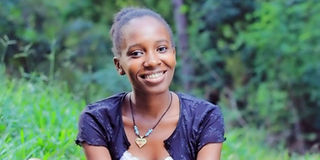Winnie Barawa: I use drama to pass health messages

Winnie Barawa, 24, is a research assistant at JhPiego and the founder of Washindi Africa Programme. PHOTO| COURTESY
What you need to know:
- It is a battle that Winnie is not prepared to loose, and she soldiers on, hoping that one day the voice of the Kilifi youth will be heard.
- In the meantime, she is doing her own little thing, to ensure that the young people are well prepared for the future ahead of them.
Winnie Barawa, 24, is a research assistant at JhPiego, an international, non-profit health organisation affiliated with The Johns Hopkins University.
Her passion about community service led her to start the Washindi Africa Programme that seeks to empower young people on health matters.
To reach her targeted audience, she packages health information in drama form. Winnie is also an appointed Kilifi youth Senator, having passed a rigorous vetting process in 2016.
“As a youth Senator, I spearhead and coordinate county-level initiatives around youth advocacy, human rights and accountable governance.
I am currently working on a project dubbed ‘Kilifi County for higher education’, targeting school drop outs and form four leavers with the aim of empowering them to join institutions of higher learning such as polytechnics, colleges and universities”, she says.

Some of Winnie Barawa's trainees during a session. PHOTO| COURTESY
However, Winnie notes that her mission is not without challenges, the greatest being the long-tiered bureaucracy in Kilifi.
“Most often, the procedures involved are not supportive or have little consideration for the youth input.
DISHEARTENING TRUTH
For instance, youth in my county were extensively involved in the development of the County Integrated Development Plan(CIDP) community forums. We mobilised the public and attended the forums. However, majority of our suggestions were not captured in the CIDP documents. The disheartening truth is that most of the proposed programs and policies you find are a carry forward of what was proposed in the previous leadership
and not new suggestions from the youth,” she laments.
It is a battle that Winnie is not prepared to loose, and she soldiers on, hoping that one day the voice of the Kilifi youth will be heard. In the meantime, she is doing her own little thing, to ensure that the young people are well prepared for the future ahead of them.
THE BIRTH OF WASHINDI AFRICA
“I started Washindi Africa in March 2015 while in my third year of university. Then, my main goal was to visit learners in their schools, offer them motivational talks and empower them for academic excellence. In May 2016, I took key interest in the health and wellbeing of the students, and added this to my talks. Health issues especially those touching on sexual and mental health have a significant impact on young people.
For instance, I came across students who still wet their beds and this affected their esteem and academics by extension. Together with a few friends, we started sharing information on how students would take care of their health as well as proper channels of seeking treatment.
In 2017, we twitched our model and formed school health clubs as platforms for the learners to share health information. We currently have 12 active clubs in Kilifi county,” she offers.
Winnie is happy that so far, at least 500 students are enrolled in the clubs.
The resulting effect, she notes, is that there has been a tremendous improvement in terms of the teenagers sharing about their health issues. “They have become more open in discussing their concerns. Our approach is also very friendly as we often use drama and art to pass these health messages.
Most of the club members are teenagers thus its bring joys when they open up on their personal health issues that affect them. Some share their issues directly with me, while others through our club coordinators.
The plus in all this is that my background in health enables me access assistance from other medics and experts in case I come across a health issue that is not in my forte. We also partner with doctors and counsellors where treatment is required. It is a full outfit,” She says.
SCALING HEIGHTS THROUGH DRAMA
Besides her deep involvement with the Kilifi youth matters, Winnie has had two of her scripts set for staging at the International Conference for Family Planning in November 2018 in Kigali, Rwanda.

Winnie Barawa during a training. PHOTO| COURTESY
This is what she had to say about the scripts: “Ms Vee for Sale features the family planning/contraceptive experiences faced by sex workers and their daily struggles, especially the youth. The other one Uncensored Islanders focuses on members of the LGBTQI community and their access to contraceptives and family planning services. I was rather hesitant about the latter script because such issues always raise eyebrows, but then realised to achieve universal health care the services, the society should be all inclusive.”
Winnie is happy to have incorporated her training and her passion to positively impact on the society.
Noting that the youth are drawn to visuals and imagery, she affirms that art is effective in raising awareness on health matters among them. “Art has this permanent kind of effect. It is enjoyable, easy to understand and yet one cannot easily forget what they learnt.”
Her eyes are set on running for an elective position in the next general elections, probably the senatorial seat, but in before then, the Kilifi youth and their health is her major preoccupation.
The person she looks up to as she champions health for all is her university chancellor.
“Prof Miriam Were, a global health champion has contributed greatly in universal health policies. I am inspired by her works and hope to walk in the same path as we strive to achieve universal health care,” she concludes.





